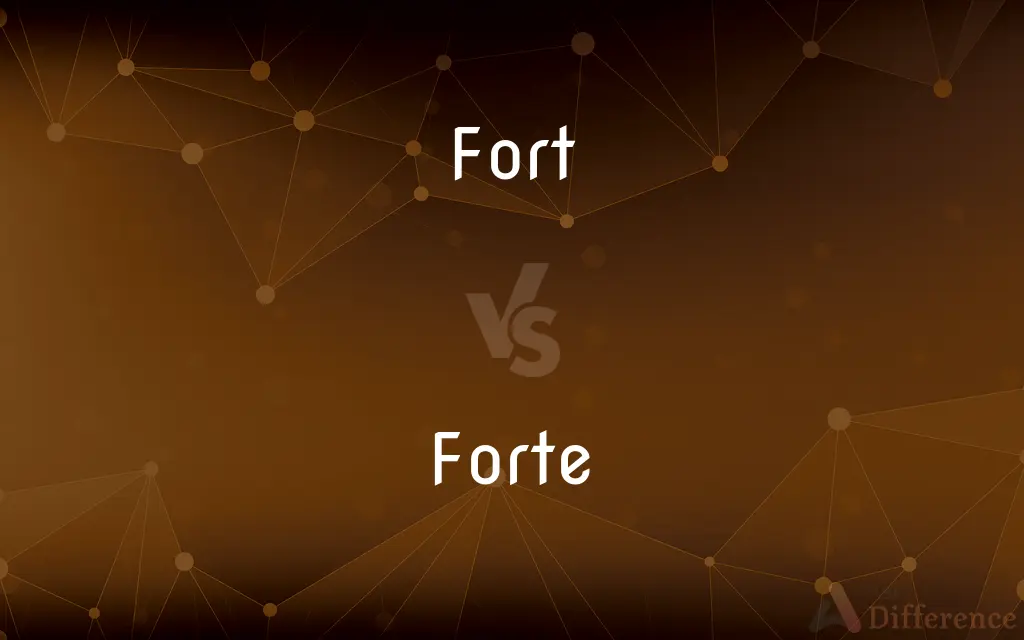Fort vs. Forte — What's the Difference?
By Tayyaba Rehman — Updated on September 19, 2023
A "Fort" is a fortified building or military post. "Forte" refers to a person's strong point or talent. Both words differ in meaning, usage, and context.

Difference Between Fort and Forte
Table of Contents
ADVERTISEMENT
Key Differences
"Fort" is a noun that primarily refers to a strong or fortified place, typically used for military defense. It denotes strength in terms of physical structures, where soldiers could be stationed for protection against invaders. On the other hand, "Forte" is often used to indicate an individual's strength or special talent in a particular area.
Historically, a "Fort" was constructed as a defense mechanism in strategic locations to ward off potential threats. These structures were usually surrounded by walls, moats, and other defenses. In contrast, "Forte" derives from the realm of personal capabilities, highlighting where someone excels or stands out.
In some contexts, "Forte" can also refer to the louder portion or passage in a musical composition, originating from the Italian word for "strong." This is quite different from "Fort," which always aligns with the idea of a stronghold or barricade.
Phonetically, "Fort" and "Forte" can sometimes be a point of confusion. While "Fort" has a single pronunciation, "Forte," when referring to a person's strength, is often pronounced "fort," but when referring to music, it's "for-tay."
To summarize, "Fort" is rooted in physical defense and architecture, whereas "Forte" revolves around personal strengths or musical dynamics.
ADVERTISEMENT
Comparison Chart
Definition
A fortified building or military post
A person's strong point or talent
Origin
Middle English (denoting strong place)
Italian (musical term for 'strong')
Usage Context
Military, strategic locations
Personal capabilities, musical dynamics
Pronunciation
Fort
Fort (talent) or For-tay (music)
Associated Terms
Fortress, stronghold
Expertise, specialty
Compare with Definitions
Fort
A stronghold or barricade.
The invaders found it difficult to breach the Fort.
Forte
A person's strong point or talent.
Mathematics is her Forte.
Fort
A structure built for defense against enemies.
The soldiers sought refuge inside the Fort during the attack.
Forte
A musical directive indicating a passage should be played loudly.
The pianist played the segment in a Forte manner.
Fort
A fortified place often in a strategic location.
The Fort on the hill offered a panoramic view of the surrounding area.
Forte
An individual's most capable or proficient area.
Her leadership skills are a true Forte.
Fort
A building used by military troops.
The Fort was home to the army regiment for years.
Forte
The part of a sword blade that's closest to the hilt and strongest.
He parried with the Forte of his blade.
Fort
A fortified building or strategic position
The city was guarded by a ring of forts
Forte
Something in which a person excels
“His forte was in defusing negative rumors before they ever exploded into news accounts” (Jane Mayer).
Fort
A fortified place or position for the stationing of troops.
Forte
The strong part of a sword blade, between the middle and the hilt.
Fort
A permanent army post.
Forte
A note, passage, or chord played forte.
Fort
A fortified defensive structure stationed with troops.
Forte
In a loud, forceful manner. Used chiefly as a direction.
Fort
Any permanent army post.
Forte
A strength or talent.
He writes respectably, but poetry is not his forte.
Fort
(historical) An outlying trading-station, as in British North America.
Forte
The strong part of a sword blade, close to the hilt.
Fort
A structure improvised from furniture, bedding, etc., for playing games.
The kids built a fort out of chairs and pillows.
Forte
A passage in music to be played loudly; a loud section of music.
This forte marks the climax of the second movement.
Fort
To create a fort, fortifications, a strong point, or a redoubt.
Forte
(music) Loud. Used as a dynamic directive in sheet music in its abbreviated form, "f.", to indicate raising the volume of the music. (Abbreviated in musical notation with an f, the Unicode character 1D191.)
This passage is forte, then there's a diminuendo to mezzo piano.
Fort
A strong or fortified place; usually, a small fortified place, occupied only by troops, surrounded with a ditch, rampart, and parapet, or with palisades, stockades, or other means of defense; a fortification.
Detached works, depending solely on their own strength, belong to the class of works termed forts.
Forte
(music) Loudly.
The musicians played the passage forte.
Fort
A fortified military post where troops are stationed
Forte
The strong point; that in which one excels.
The construction of a fable seems by no means the forte of our modern poetical writers.
Fort
A fortified defensive structure
Forte
The stronger part of the blade of a sword; the part of half nearest the hilt; - opposed to foible.
Fort
Gather in, or as if in, a fort, as for protection or defense
Forte
Loudly; strongly; powerfully.
Fort
Enclose by or as if by a fortification
Forte
An asset of special worth or utility;
Cooking is his forte
Fort
Station (troops) in a fort
Forte
(music) with great loudness
Fort
A symbol of protection and strength.
The city's Fort stood undamaged even after the war.
Forte
The stronger part of a sword blade between the hilt and the foible
Forte
Used chiefly as a direction or description in music;
The forte passages in the composition
Forte
Used as a direction in music; to be played relatively loudly
Forte
An area where someone excels.
Writing is not my Forte.
Common Curiosities
An individual's most capable or proficient area.
Her leadership skills are a true Forte.
The part of a sword blade that's closest to the hilt and strongest.
He parried with the Forte of his blade.
A person's strong point or talent.
Mathematics is her Forte.
Can "Forte" refer to something in music?
Yes, "Forte" indicates a loud passage in a musical composition.
Were forts used in ancient times?
Yes, forts have been used throughout history for defense.
Can "Forte" describe a strength in an academic subject?
Yes, e.g., "Biology is her Forte."
Is a "Fortress" the same as a "Fort"?
A fortress is generally larger and more fortified than a fort, but both serve defensive purposes.
An area where someone excels.
Writing is not my Forte.
A musical directive indicating a passage should be played loudly.
The pianist played the segment in a Forte manner.
Does "Forte" always refer to positive talents?
Generally, yes. It highlights where someone is particularly skilled or talented.
How do you pronounce "Forte" when talking about talent?
It's often pronounced "fort."
Is there a difference between a person's "Forte" and their "passion"?
Yes, a "Forte" is where someone excels, while "passion" is about what they deeply enjoy or care about.
Are "Fort" and "Forte" interchangeable?
No, "Fort" refers to a fortified place, while "Forte" means a strong point or talent.
Is it correct to say, "Cooking is my Fort"?
No, the correct term would be "Cooking is my Forte."
Are forts always military in nature?
Primarily yes, but some forts, especially historical ones, serve as tourist attractions today.
Can "Forte" be used to describe a company's primary strength?
Yes, e.g., "Software development is their Forte."
Can a person have more than one "Forte"?
Yes, an individual can excel in multiple areas.
What's the opposite of musical "Forte"?
The opposite is "Piano," indicating a soft or quiet passage.
Can you find a "Fort" in a city?
Yes, many cities have historic forts, either preserved or converted for other uses.
Are all forts made of stone?
No, forts have been made from various materials throughout history, including wood and earth.
Share Your Discovery

Previous Comparison
Guaranteed vs. Guarantee
Next Comparison
Hind vs. HartAuthor Spotlight
Written by
Tayyaba RehmanTayyaba Rehman is a distinguished writer, currently serving as a primary contributor to askdifference.com. As a researcher in semantics and etymology, Tayyaba's passion for the complexity of languages and their distinctions has found a perfect home on the platform. Tayyaba delves into the intricacies of language, distinguishing between commonly confused words and phrases, thereby providing clarity for readers worldwide.















































